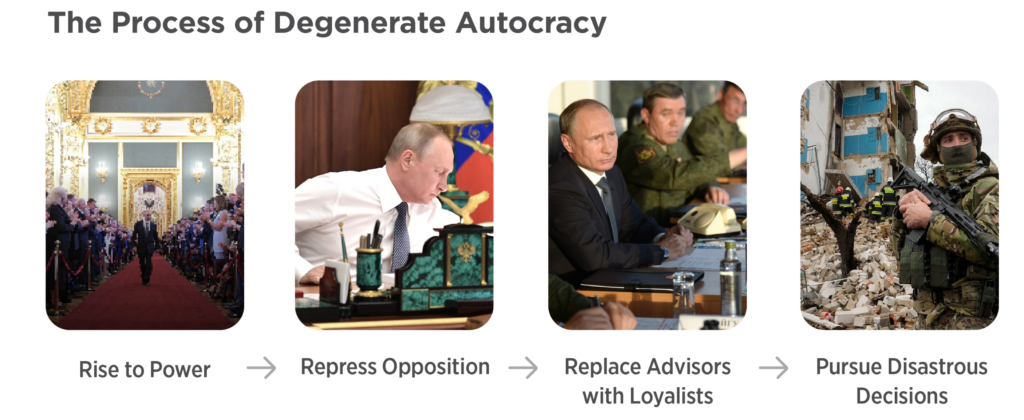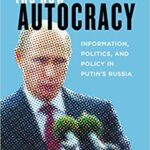Does Putin’s 2022 invasion of Ukraine highlight the paradox of the dictator who plots a path to their own downfall? Dictators who combine emphasis on loyalty with repression of opposition may create degenerate autocracy, George Egorov and Konstantin Sonin argue in a new analysis.
The shift into autocracy begins with a leader’s decision to repress their opposition, they write for the University of Chicago’s Becker Friedman Institute. By doing so, they lessen their present odds of being challenged but raise the future stakes of power struggles. Faced with the fear of being tried and executed, the repressive leader appoints less competent advisers who are less likely to identify their vulnerability and therefore remain loyal. Less competent advisers give poorer policy advice. RTWT

Credit: Becker Friedman Institute
The consequences of Russia’s war economy are less controversial than detrimental, argues Stefan Hedlund, director of research at Uppsala University’s Centre for Russian and Eurasian Studies. The shift is required to keep fighting, yet such a transformation means a return to pervasive authoritarian control.
The weaknesses of autocracy
 At times of major armed conflict, even democracies have intervened in the market to ration consumer goods and reorient. But after the crisis, democracies remove vertical command structures and restore essential freedoms. Autocracies do not, he writes for GIS.
At times of major armed conflict, even democracies have intervened in the market to ration consumer goods and reorient. But after the crisis, democracies remove vertical command structures and restore essential freedoms. Autocracies do not, he writes for GIS.
Putin has been fighting a second war in Russia itself, the Carnegie Endowment’s Andrei Kolesnikov writes in Foreign Affairs, “and this war is unlikely to go away even if the conflict in Ukraine becomes frozen.”
Putin still seems secure in the Kremlin, Christian Science Monitor reports. But, according to Damon Wilson, the president and CEO of the National Endowment for Democracy (NED), “History tells us the most repressive and seemingly secure regimes can crumble, brought down by ordinary people demanding freedom.”
 A Russian humiliation in Ukraine would undermine Beijing’s narrative of an alternative world order, giving the United States greater latitude to focus its energies and resources on competing with China, say analysts Liana Fix and Michael Kimmage. To prevent this outcome, China could opt to throw Russia a lifeline beyond economic and moral support and supply its partner with lethal military aid. It could do so to prolong the war, to stave off a Russian defeat, or to speed some kind of Russian victory.
A Russian humiliation in Ukraine would undermine Beijing’s narrative of an alternative world order, giving the United States greater latitude to focus its energies and resources on competing with China, say analysts Liana Fix and Michael Kimmage. To prevent this outcome, China could opt to throw Russia a lifeline beyond economic and moral support and supply its partner with lethal military aid. It could do so to prolong the war, to stave off a Russian defeat, or to speed some kind of Russian victory.
China has three broad interests regarding the war in Ukraine, they write for Foreign Affairs:
- The first is preventing Putin’s downfall. Russia with Putin at the helm is a valuable asset for China. It figures in China’s Cold War–style rivalry with the United States. It provides cheap energy and sizable markets for China. Beijing does not want Putin to be replaced by a less friendly leader, nor does it want to see domestic instability in Russia induced by a lost war in Ukraine. …
- China also understands that the war in Ukraine has ramifications for international order. Were the war to conclude on Western terms with a clear Ukrainian victory, the United States would define the war as a triumph for its international order, its rules, its power, and its diplomatic acumen. This would deal a blow to China’s aspirations for a new global order with Chinese (or Chinese-Russian) characteristics. ..
- China’s third interest, which may not be completely compatible with its second interest, is to have a meaningful stake in the aftermath of the war in Ukraine. Beijing is largely content to let Russia, Ukraine, and the West exhaust themselves in the fighting, but it wants to have a say in the eventual peace process and the postwar economic landscape of Ukraine.
 Every day, Ukrainian soldiers are making the ultimate sacrifice to defend their territory, their freedom, and their democracy, the International Working Group on Russian Sanctions observes. The least that the rest of the democratic world can do is show more leadership in imposing and implementing sanctions to reduce Russia’s capability to kill Ukrainian soldiers and civilians, while illegally occupying Ukrainian land.
Every day, Ukrainian soldiers are making the ultimate sacrifice to defend their territory, their freedom, and their democracy, the International Working Group on Russian Sanctions observes. The least that the rest of the democratic world can do is show more leadership in imposing and implementing sanctions to reduce Russia’s capability to kill Ukrainian soldiers and civilians, while illegally occupying Ukrainian land.
Its new Action Plan 2.0 outlines a roadmap for sanctions policy development and new actions in 2023, aiming to think creatively, provide new ideas to countries implementing sanctions and help to stave off sanctions fatigue.
Join Mike @McFaul @FSIStanford & other members of the International Working Group on Russian Sanctions to discuss the group’s new white paper, #ActionPlan2.0: Strengthening #Sanctions against the Russian Federation. https://t.co/9IihODwe8e
— Democracy Digest (@demdigest) April 28, 2023
French philosopher Bernard-Henri Lévy takes us to the heart of the conflict through his war diary (below) made during the second half of 2022. From Kharkiv, in the Donbass, to Kherson, in the aftermath of the city’s liberation, this documentary bears witness to the ravages of war through the testimonies of soldiers, chronicles of the front and portraits of civilians, and shares with us the struggle of the Ukrainian people.
Filmmaker Bernard-Henri Lévy will appear in person at Landmark’s E Street Cinema, Washington, DC, on Thursday, May 11 for a Q&A after the 7:00pm show. RSVP
#Putin may seem secure, but… “History tells us the most repressive and seemingly secure regimes can crumble, brought down by ordinary people demanding freedom,” @DamonMacWilson, president & CEO of @NEDemocracy tells @csmonitor. https://t.co/lgvhB6DhEW
— Democracy Digest (@demdigest) April 27, 2023







